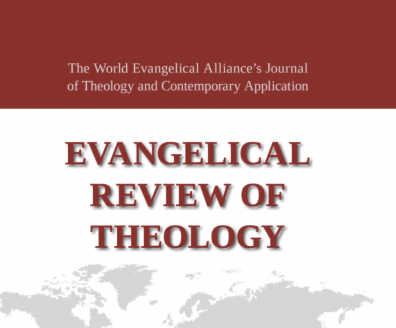In een nieuw verschenen editie van de ERT (49:1), uitgave van de World Evangelical Alliance, staan een aantal artikelen die missiologisch van belang zijn. Onderstaand is van een aantal artikelen een alinea overgenomen ter introductie van de verschillende thema’s. Hiernaast staan er nog andere artikelen en boekbespreking in ERT.
De WEA schrijft: The World Evangelical Alliance’s Evangelical Review of Theology is afree, open-access journal in which WEA leaders and other prominent Christians address issues of contemporary concern to the global body of Christ.
Evert Van de Poll: Evaluating the Lausanne Congress’s Seoul Statement
In the passages describing the gospel and the double priority of evangelisation and discipleship, something like a new mission model emerges. The Seoul Statement ignores well-known models like holistic mission, integral mission, missio dei, or the Five Marks of Mission, a model developed in the Anglican Church and widely adopted in Europe. It also bypasses the debate about the relationship between proclamation and social responsibility. Instead, it introduces a new terminology: ‘declare and display’, and ‘presence, proclamation and practice’.
Robert Gyakye Coleman: Reframing Spiritual Power in African Christianity in Light of the Scandal of the Cross
In the African context, where spiritual authority and tangible demonstrations of power are highly valued, the implications of the message of Christ crucified encounter resistance reminiscent of that in the first century. Christianity has witnessed phenomenal growth in Africa, rising from 9.1 percent of the population in 1910 to 62.7 percent in 2010.2 Despite this vibrant and rapidly expanding landscape, the implica[1]tions of Christianity’s message of a suffering and crucified Saviour often contrast sharply with deeply rooted African cultural beliefs and expectations of divine power. This article argues that the paradoxical nature of God’s power, as revealed in the crucified Christ, profoundly challenges traditional African conceptions of power and spirituality. While this tension does not preclude the possibility of deep, authentic faith among African Christians, it does create a significant cultural and theologi[1]cal dissonance that can impede full commitment to the faith and contribute to nominal spirituality among some African Christians.
Edward L. Smither: Does Embracing Global Theology Mean the Church Should Abandon the Historic Creeds?
As Stephen Pardue explains in his recent book, the global church, particularly the church in the West, will be enriched and challenged by reading, listening to and engaging with global theology. But does embracing global theology mean the church should abandon the historic creeds? Are the Apostles’, Nicene, and Athanasian Creeds so located in the Western context that they are not useful to the global church today? Should the global church, as Kevin Vanhoozer asks, ‘play by western Christianity’s rules in order to do theology’? In this paper, with a focus on the creedal material that became the Apostles’ and Nicene Creeds, I argue that the early creeds were forged in a global context and remain important for global worship because they faithfully describe the gospel for the one holy, catholic and apostolic global church. At the same time, the nature and purpose of the creeds encourage diverse expression, especially as their contents are unpacked and reflected upon in discipleship.
Steven Paas: God Is Love: In Christ for a World Full of Hate and Conflicting Views of Israel
This article is a Christian answer to the challenge of the spiral of hate and violence in the Middle East, which has complicated the conversation about ‘Israel’. Supporters of conflicting views on the issue are becoming increasingly polarized. How can we identify the source of the problem, and what is the solution? I am convinced that both can be found in the Bible as God’s Christ-centred message of love to all peoples. In this article, I continue the dialogue1 about the position of ‘Israel’ in personal faith, in theology and in the church. The article concludes that one-sidedly religiously elevating ‘Israel’ in one’s perception of God’s plan for the world endangers the spiritual and political welfare of Jews and non-Jews. It leads away from Christ and triggers anti-Semitism.
Wouter van Veelen: Byang Kato: A Personal Reflection
Just before being appointed as AEA general secretary, Kato warned in a lecture against what he called ‘theological anemia in Africa’. Kato claimed that the spiritual battle for Africa would be largely fought ‘on theological grounds’. Despite the explosive numerical growth of Christianity on the African continent in the preceding decades, Kato argued, it was questionable whether Christianity had a future in Africa, because the African church was deficient in sound theology. In his view, contemporary African Christianity was threatened by multiple liberal tendencies and could survive only if a strong biblical foundation was laid. He called on African evangelical leaders to take up this theological task, especially by prioritizing theological education and training.

